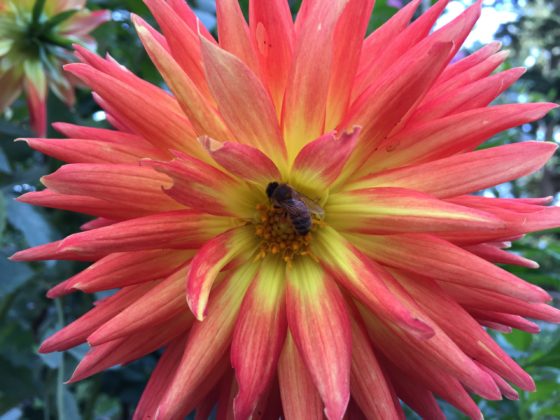
In his book, “How to Change Your Mind,” which I wrote about last year, author Michael Pollan writes of Peter Hendricks, a psychologist conducting a trial using psilocybin (aka magic mushrooms) to treat cocaine addicts. According to Hendricks, “People who are addicted know they’re harming themselves – their health, their careers, their social well-being – but they often fail to see the damage their behavior is doing to others.”
One of the challenges of treating the addict is getting him to broaden his perspective beyond a consuming self-interest in his addiction. Awe, Hendricks believes, has the power to do this. “It’s advantageous for the (us) to have an emotion that makes us feel part of something much larger than ourselves.”
There are ways to help people experience awe – looking at soaring trees, Hendrix continues, “…it can be blissful to feel a part of something larger and greater than themselves, to feel reconnected to other people… Very often they come to recognize the harm they’re doing not only to themselves but to loved ones… The motivation to change often comes from… a renewed sense of connection and responsibility, as well as the positive feeling of being a small self in the presence of something greater.”
As I have written about previously, one of my all-time favorite books is The Children, by David Halberstam, about a group of young people (including the late Congressman John Lewis), who put themselves in harm’s way to advance the civil rights movement of the early 1960s. It was in that book I first heard the phrase, “a purpose bigger than herself (or himself),” which Halberstam used over and over as he described what led these courageous young adults to do what they chose to do.
If you are a parent, you have certainly experienced the concept of something bigger than yourself. I have often said parenthood is one of the few things that cannot be overhyped. Unlike a movie which can fail to live up to expectations, no matter what you are told about the love you will feel for your children, you will love them even more than you can imagine is possible.
And those feelings are not limited to your children. They can come from your love for any being you are responsible to care for including children you care for who are not related to you and, certainly, pets.
I am not an expert on helping drug or alcohol abusers, and I don’t have suggestions related to those addictions. I share Hendricks’ comments about awe because they can likely help with other habit change – such as the need to eat well and exercise to prolong your life for more than just yourself.
Many unhealthy eating habits are the result of addictions. WebMD has an excellent piece on sugar addiction and another one on hidden sugars. If, like many people, you are addicted to sugar in an unhealthy way, perhaps thinking bigger than yourself will help you with habit change. It’s certainly worth trying!
Be well,
David
